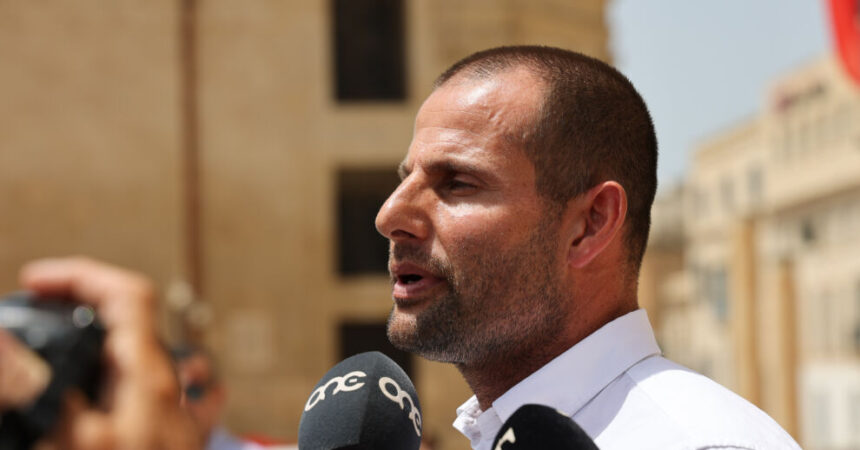When PN MP Graziella Attard Previ asked Prime Minister Robert Abela what the government has been doing to improve the situation for journalists in Malta, the Prime Minister went on to give a lengthy response that included criticism of RSF’s Press Freedom Index, followed by several misleading statements about the government’s press freedom credentials.
Given Abela’s loquaciousness, The Shift is breaking down his answers into more digestible elements that can be scrutinised within the proper context.
Abela starts with a dig at the (Reporters Without Borders) RSF Press Freedom Index, in which Malta still ranks among the worst countries in the EU for press freedom.
Abela said the government “fully respects the Index, but in the end, like any report of its kind, represents the point of view and reflects the motivation and perspective of those who wrote it”.
A single author does not define Malta’s ranking in the World Press Freedom Index. The score is based on RSF’s methodology, including a questionnaire of more than 100 questions sent to journalists, editors, academics, researchers, lawyers and human rights defenders in Malta.
He adds that Malta is criticised for reasons intrinsic to Malta’s size, such as the influence of political parties in the media and the polarising political environment – reasons that Abela’s administration and that of his predecessor have done little to fix, not just according to RSF’s report but also according to pan-European studies such as the Media Pluralism Monitor.
Abela claims the RSF Report on Malta includes several misleading claims. He points out that one such claim suggests the numerous appeals his government has lodged against decisions made under the Freedom of Information Act constitute a new form of SLAPP.
This is because, according to the Prime Minister, a SLAPP (Strategic Lawsuit Against Public Participation “one understands a situation where someone (usually someone financially powerful) starts proceedings against a journalist or publisher to silence them by forcing upon them legal expenses they can’t cope with”.
While not private individuals, government entities are financially powerful and can afford to hire scores of lawyers to challenge a community-funded news portal that requests information in the public interest. The flurry of appeals instigated by the government against one newsroom is still a form of intimidation meant to dissuade others from submitting FOI requests.
The Council of Europe, among other international organisations, has already warned Abela about this.
When Abela describes the government’s efforts to enhance media freedom and the protection of journalists in Malta, he emphasises the three draft media Bills presented in parliament in October 2022.
Still, he laments that “were it not for the additional consultation requested to what had already been done, these have long since been adopted into law”.
The additional consultation was requested for good reason. The government’s legislative proposals do not meet international standards. The Bills the government presented in parliament in 2022 need to be replaced as they fail to meet international standards (OSCE RFoM 1, OSCE RFoM 2) and “fail to create the systemic reforms required to foster an enabling environment for free and independent journalism” (MFRR).
The committee of media experts appointed by the Prime Minister was given three months to submit its comments and suggestions on draft legislation prepared by the government.
It was never consulted during the drafting of the Bills and was even asked to keep its discussions confidential, excluding many media and journalism stakeholders.
Abela’s reply also boasted that Malta was the first EU country to transpose the EU anti- SLAPP Directive. However, Abela does not mention that several NGOs, including the Institute of Maltese Journalists (IGM), expressed disappointment that the law, enacted by Legal Notice, falls short of providing comprehensive protection against abusive litigation.
They stressed that while the directive’s enactment was a positive step, it was limited to cross-border SLAPP cases, leaving domestic cases unprotected.
International organisations criticised the repurposing of directive elements that could confuse the preconditions for early dismissal of SLAPPs and the capping of maximum penalties at €10,000, which they deemed insufficient to deter wealthy plaintiffs.
Additionally, the groups noted the lack of measures to raise awareness or support for those targeted by SLAPPs, as recommended by the European Commission and the Council of Ministers.
They urged the government to address these shortcomings in the forthcoming White Paper on media reform, saying Malta has the opportunity to set a positive example for other EU countries.
The IGM, while welcoming the government’s implementation of the anti-SLAPP directive, also said it was only a part of the broader reforms needed to protect journalists. It criticised the delay in launching a White Paper on media reform laws, a promise made over a year ago.
Abela also fails to mention how members of his party have started toying with the idea of re-introducing criminal libel, like the Labour Party’s outgoing president, Ramona Attard, who stated in September that decriminalising criminal libel was a mistake and called for increased fines for civil convictions.
This prompted a statement from the IGM that called on the government to “not do a U-turn” and reinstate the criminal libel law, adding that “It is regrettable that singular exponents of the Labour Party have resuscitated the idea of reintroducing criminal libel.”













Can you please tell me what has become of the 40 Maltese-GOVERNMENT SLAPP lawsuits against THE-SHIFT-NEWS?
All won or maybe something still open?
BTW: Without offending the legal system:
To save time and costs, these sad lawsuits would have been summarised in a ‘class action’ in other European countries.
We have won all the ones decided but there’s still more ongoing.
GREAT.JUST GREAT.
Please allow me to be honest here:
These 40 lawsuits are a revelation.
Not only for the helpless ROBBER Abela, but especially for the 40 spineless people who filed the lawsuits and just obey like a ….